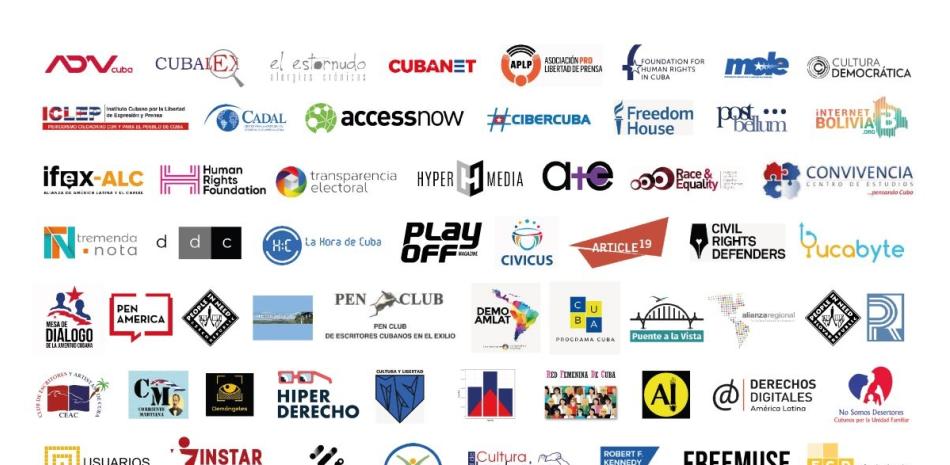The Cuban Parliament plans to approve the Social Communication Law in a few days, a norm that will regulate the media on the island and that independent journalists and NGOs fear will mean another twist on the non-official digital media that remain within the country.
The objections to the project start from a shared premise: the bill only recognizes the legality of the media that, to a greater or lesser extent, are linked to the State or the Communist Party (PCC, the only legal one).
This was already established in the Constitution approved in 2019, which ensures that the national media “are socialist property” and “cannot be the object of another type of property.”
But this text goes further because content issues are established, such as that they cannot “destabilize the socialist State.” And that the communication system “acts in accordance with the socialist State” following the “example of (José) Martí and Fidel (Catro) and the ideas of (…) Marx, Engels and Lenin.”
The newspaper Juventud Rebelde, which belongs to the Union of Young Communists, stated this week that the project “is inspired by the legacy” of “Fidel Castro Ruz, the great communicator of the Revolution.”
Questions like these have set off alarm bells in different international organizations, who affirm that it will increase the pressure on editors and non-official media.
The Government defends the importance of the law, the first of its kind, and emphasizes that this version, which will be voted on next Thursday, is number 34 – the previous one was to be approved at the end of 2022 and was postponed for the “complexity” of the subject– and that shows, they insist, that it arises from an intense internal debate.
They also highlight new features compared to previous versions, such as the fact that advertising financing will be allowed for the first time.
DOES NOT RECOGNIZE INDEPENDENTS
In none of the 55 pages of the bill is the independent digital media mentioned, many of them emerged during the so-called “thaw” -the rapprochement between the US and Cuba from 2014 to 2017- and which, for the most part, They have left the country in recent years after pressure from State Security.
“This law does not guarantee freedom of the press nor does it allow the dissemination of content independent of that generated by the State,” Claudia Ordóñez, an officer with the Central America and Caribbean program of Article 19, an international organization based in London, said in an interview with EFE. defends the right to information.
This criticism is shared by Raudiel Peña, coordinator of the Legislative Observatory of Cuba: “It does not recognize their legal personality. Nor to citizen journalism. Only to those who have a link with the State ”, he underlines.
Both Peña and Ordóñez recall the entry into force at the end of 2022 of the new Criminal Code, which penalizes external financing of independent media with imprisonment under the pretext that it seeks to destabilize the State from abroad.
However, Rafael Hernández, director of the Cuban magazine Temas, and who was part of the internal discussions that led to the final text, disagrees with the critics and argues that the independent media are only “anti-government,” as he explained.
Nor does it agree with the idea that the law only accommodates state media and those close to the PCC. In his opinion, the text establishes the possibility of creating media outlets outside of the state orbit.
According to the bill, in addition to the state media, media belonging to “political, mass and social organizations, associative forms or other economic and social actors” can be established, which in the opinion of independent experts does not guarantee diversity of voices because the vast majority are controlled or in the orbit of the PCC.
However, the law does not allow these entities to launch general media and limits the content palette to “the economic or social activity of its owner.”
Hernández qualifies that point: “Everything is political. The publications of the Catholic Church (in Cuba), for example, are not only about religious things”. For this intellectual, it remains to be seen to what extent the new law will “allow or not” the “new political culture” that is lived on the street.
“THE CIRCLE IS CLOSED”
For Peña, the Social Communication law “closes the circle” that began with the “reluctant tolerance” of the Cuban government during the “thaw,” a time when critical digital media flourished.
More than five years later, a good number of these reporters and newsrooms have had to continue their work from outside Cuba, mainly from Miami, Madrid and Mexico, after denouncing pressure from State Security.
One of the last episodes occurred last year with the independent media El Toque. Nine of his collaborators – many recent graduates – made their resignation public after interviews with State Security agents.
“It is difficult to do quality journalism independently because Cuba is an authoritarian regime (…) (but) the independent press no longer depends on being outlawed or not, it will continue to exist no matter how much they want to cut the strings and repress to the journalists”, assures EFE one of the reporters who resigned after those events.
In this sense, José Jasán Nieves, editor-in-chief of El Toque, told EFE that “it will be a matter of continuing to do journalism (…) luckily the Cuban nation has already crossed the country’s territorial borders a long time ago and, therefore, , Cuban journalism can be done and for Cuba without being under the effect of a norm of this type” .
He also stated that the outlet – whose headquarters are in Miami – will continue to work with collaborators on the island despite the difficulties.
